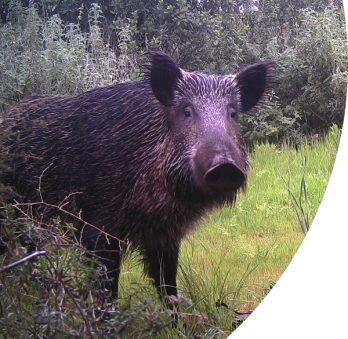The wild boar is a large mammal that usually lives in a wide variety of habitats and climatic conditions. Over the last forty years, wild boar have expanded their geographic distribution into new areas, and their population density has increased its range. The expansion in space and demographic growth are mainly explained by increased food availability especially in agricultural and urban areas: by humans feeding boars and the availability of domestic waste and agricultural crops. In light of the increase in the demographic growth of the boars, there are more and more conflicts with humans and it is clear that the boars are invading neighborhoods in search of food and water.
In recent years, the Technion area has suffered from the phenomenon of wild boars entering its territory.
Due to the abundance of landscaping, natural woodland and juicy food in the garbage bins on campus, the pigs chose to live at the Technion.
Some of them, with an affinity for the forest, chose to make use of the loopholes and enter the Technion every night, and some of them are more stable and located in the many thickets of the campus.
In August 2021, after the Technion suffered severe injuries, daily damage, sanitation problems, threat and attack on the residents of the campus, it was decided to invest and address the problem in a lateral manner. For this purpose, the budgets were allocated and a team was appointed to deal with the leadership of the director of Open spaces, accompanied by a Technion agronomist and an ecologist on his behalf.
Stages of treatment:
- Extensive monitoring through dozens of cameras, surveillance and night patrols and more than 40,000 records were collected.
- Identification and mapping of the places of stay, intrusion routes and routes of movement of wild boars.
- Construction of a permanent fence with a total length of 1800 meters, which encloses all the areas where wild boars have the opportunity to enter the campus.
- Installation of 4 pedestrian gates, 5 for vehicles and 2 cattle crossings adapted for the wild boars on routes that must have remained open and still prevent the passage of the wild boars.
- Creating one-way passages that allow the wild boars to leave the Technion grounds and at the same time prevent their entry.
- Pruning vegetation and changing the structure of a habitat where wild boars sleep.
- Detect and repair large and small loopholes immediately.
- Changing the hours of removal of waste from campus garbage.
The situation on campus today is fragile and unstable.
It is impossible to reach a situation where there are no wild boars at all at the Technion, even after completing all the tasks, but the few who remain on campus have a negligible impact.
The need to continue to regularly monitor and maintain the integrity of settings, controller passes and gateways will remain.
In light of the recent findings of students directed feeding of wild boars, the creation of new loopholes, the failure to close gates, penetration through the Technion gate, and more…, the importance of cooperation between the various entities at the Technion for the success of the project (security, landscaping, sanitation, maintenance and Technion residents) increases.
Without cooperation, we can in a blink of an eye return to where we were in 2021.




